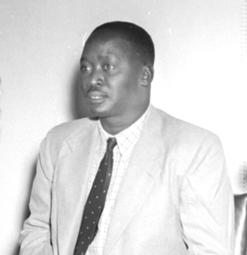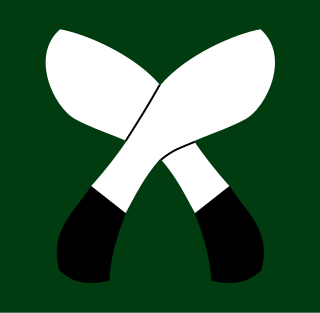
The Kenya Defence Forces (KDF) are the armed forces of the Republic of Kenya. They are made up of the Kenya Army, Kenya Navy, and Kenya Air Force. The current KDF was established, and its composition stipulated, in Article 241 of the 2010 Constitution of Kenya; it is governed by the KDF Act of 2012. Its main mission is the defence and protection of the sovereignty and territorial integrity of Kenya, recruitment to the KDF is done on yearly basis. The President of Kenya is the commander-in-chief of the KDF, and the Chief of Defence Forces is the highest-ranking military officer, and the principal military adviser to the President of Kenya.

Daniel Toroitich arap Moi was a Kenyan politician who served as the second president of Kenya from 1978 to 2002. He is the country's longest-serving president to date. Moi previously served as the third vice president of Kenya from 1967 to 1978 under President Jomo Kenyatta, becoming the president following the latter's death.

The Kenya African National Union (KANU) is a Kenyan political party that ruled for nearly 40 years after Kenya's independence from British colonial rule in 1963 until its electoral loss in 2002. It was known as Kenya African Union (KAU) from 1944 but due to pressure from the colonial government, KAU changed its name to Kenya African Study Union (KASU) mainly because all political parties were banned in 1939 following the start of the Second World War. In 1946 KASU rebranded itself into KAU following the resignation of Harry Thuku as president due to internal differences between the moderates who wanted peaceful negotiations and the militants who wanted to use force, the latter forming the Aanake a forty, which later became the Mau Mau. His post was then occupied by James Gichuru, who stepped down for Jomo Kenyatta in 1947 as president of KAU. The KAU was banned by the colonial government from 1952 to 1960. It was re-established by James Gichuru in 1960 and renamed KANU on 14 May 1960 after a merger with Tom Mboya's Kenya Independence Movement.

The King's African Rifles (KAR) was a British Colonial Auxiliary Forces regiment raised from Britain's East African colonies in 1902. It primarily carried out internal security duties within these colonies along with military service elsewhere during the world wars and other conflicts, such as the Malayan Emergency and the Mau Mau uprising. The regiment's enlisted soldiers were drawn from the native Africans, while most officers were seconded from the British Army. During the 1960s, as part of the decolonisation of Africa, more African officers were commissioned into the regiment before it was gradually disbanded. KAR battalions would go on to form the core of newly established armed forces throughout East Africa.

The president of the Republic of Kenya is the head of state and head of government of the Republic of Kenya. The president is also the head of the executive branch of the Government of Kenya and is the commander-in-chief of the Kenya Defence Forces. The country's current president is William Ruto since 13 September 2022.

Jaramogi Ajuma Oginga Odinga was a Kenyan politician who became a prominent figure in Kenya's struggle for independence. He served as Kenya's first vice-president, and thereafter as opposition leader. Odinga's son Raila Odinga is a former prime minister, and another son, Oburu Odinga, is a former assistant minister in the Ministry of Finance.
Waruhiu Itote, nom de guerreGeneral China, was one of the key leaders of the Mau Mau Uprising (1952–1960) in British Kenya alongside Dedan Kimathi, Stanley Mathenge, Kurito ole Kisio, Musa Mwariama and Muthoni Kirima.
The 1982 Kenyan coup attempt was a failed attempt to overthrow President Daniel arap Moi's government on 1 August. Led by Kenya Air Force private Hezekiah Ochuka, the coup saw the rebels seize several air bases as well as the headquarters of state radio before they were retaken by government forces, resulting in the coup's failure. After being extradited back to Kenya from Tanzania, Ochuka was tried and found guilty of leading the coup attempt, and was hanged in 1987. Also implicated in the coup attempt were Jaramogi Oginga Odinga, a former vice-president to Jomo Kenyatta, and his son Raila Amolo Odinga.

Jamhuri Day is a national holiday in Kenya, celebrated on 12 December each year. Jamhuri is the Swahili word for "republic" and the holiday officially marks the date when Kenya became an independent country on 12 December 1963, six months and eleven days after gaining internal self-rule on 1 June 1963 from the United Kingdom. Kenya later became a republic, with the inauguration of Jomo Kenyatta as president taking place on 12 December 1964, exactly one year after Kenya attained independence in 1963. Kenyatta, having previously been sworn in as prime minister, continued as prime minister of newly independent Kenya, before assuming the position of president one year after Independence Day.
Charles Mūgane Njonjo was a Kenyan lawyer who served as Attorney General of Kenya from 1963 to 1979, Minister of Constitutional Affairs and the member of Parliament for Kikuyu Constituency from 1980 to 1983.
The Shifta War or Gaf Daba (1963–1967) was a secessionist conflict in which ethnic Somalis in the Northern Frontier District (NFD) of Kenya attempted to join Somalia. The Kenyan government named the conflict "shifta", after the Swahili word for "bandit", as part of a propaganda effort. The Kenyan counter-insurgency General Service Units forced civilians into "protected villages" as well as killing livestock kept by the pastoralist Somalis.

East Africa Command was a Command of the British Army. Until 1947 it was under the direct control of the Army Council and thereafter it became the responsibility of Middle East Command. It was disbanded on 11 December 1963, the day before Kenya became independent, and replaced by British Land Forces Kenya, tasked with withdrawing all remaining British troops. All remaining troops left by December 1964 and British Land Forces Kenya was disestablished.

The Kenya Army is the land arm of the Kenya Defence Forces.

The units of the Kenya Army Infantry are the principal fighting arms of the Kenya Army. The primary mission of the Infantry formations is to fight and win land battles within area of operational responsibilities in the defence of the nation against land – based aggression, while the secondary mission is the provision of aid and support to civil authorities in the maintenance of order. The Kenyan School of Infantry (SOI) is located in Isiolo County.

The Malawi Defence Force is the state military organisation responsible for defending Malawi. It originated from elements of the British King's African Rifles, colonial units formed before independence in 1964.
Magana Njoroge Mungai, M.D. EGH was a doctor, Politician - Member of Parliament, Kenyan Cabinet Minister, Businessman, Farmer, Nationalist, one of the founding fathers of the Republic of Kenya.
3 Kenya Rifles is an infantry battalion, the senior-most unit of the Kenya Army Infantry.

The presidency of Daniel arap Moi began on 22 August 1978, when Daniel arap Moi was sworn in as the 2nd President of Kenya, and ended on 30 December 2002. Moi, a KANU party member, took office following the death of the then president Jomo Kenyatta on the same day. He was sworn as interim president for 90 days during which the country was to prepare for a presidential election to be held on 8 November. Moi won reelections in 1988, 1992 and 1997, defeating Mwai Kibaki in the latter two elections. He was succeeded by Mwai Kibaki in 2002. He died at the age of 95 on 4 February 2020

The presidency of Jomo Kenyatta began on 12 December 1964, when Jomo Kenyatta was named as the 1st president of Kenya, and ended on 22 August 1978 upon his death. Jomo Kenyatta, a KANU member, took office following the formation of the republic of Kenya after independence following his efforts during the fight for Independence. Four years later, in the 1969 elections, he was the sole candidate and was elected unopposed for a second term in office. In 1974, he was re-elected for a third term. Although the post of President of Kenya was due to be elected at the same time as the National Assembly, Jomo Kenyatta was the sole candidate and was automatically elected without a vote being held. He died on 22 August 1978 while still in office and was succeeded by Daniel arap Moi.
Major General Joseph Ndolo was a former Chief of the General Staff and the first African to head the armed forces of Kenya.












